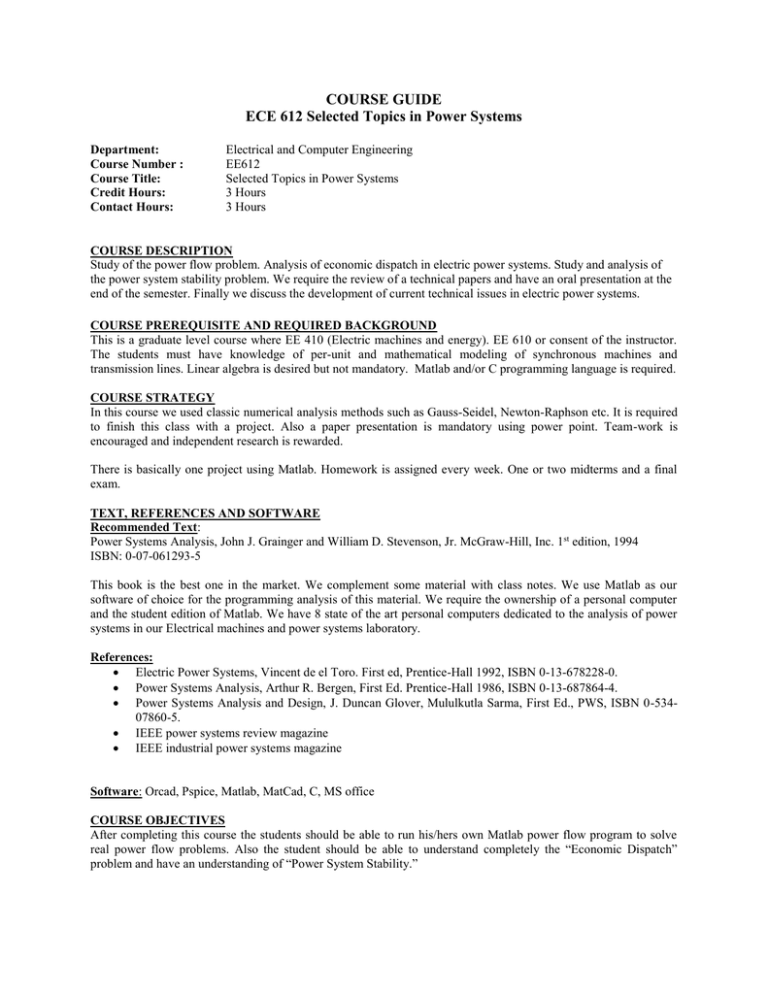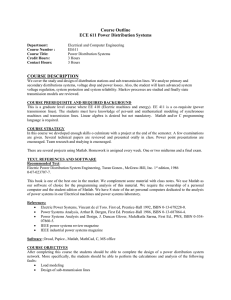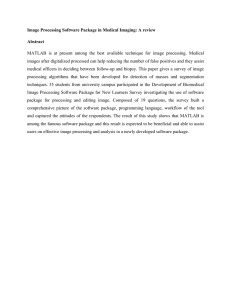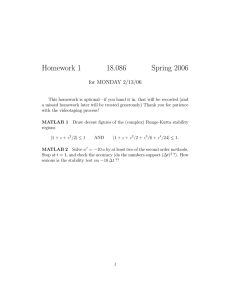ECE 612 (.doc)
advertisement

COURSE GUIDE ECE 612 Selected Topics in Power Systems Department: Course Number : Course Title: Credit Hours: Contact Hours: Electrical and Computer Engineering EE612 Selected Topics in Power Systems 3 Hours 3 Hours COURSE DESCRIPTION Study of the power flow problem. Analysis of economic dispatch in electric power systems. Study and analysis of the power system stability problem. We require the review of a technical papers and have an oral presentation at the end of the semester. Finally we discuss the development of current technical issues in electric power systems. COURSE PREREQUISITE AND REQUIRED BACKGROUND This is a graduate level course where EE 410 (Electric machines and energy). EE 610 or consent of the instructor. The students must have knowledge of per-unit and mathematical modeling of synchronous machines and transmission lines. Linear algebra is desired but not mandatory. Matlab and/or C programming language is required. COURSE STRATEGY In this course we used classic numerical analysis methods such as Gauss-Seidel, Newton-Raphson etc. It is required to finish this class with a project. Also a paper presentation is mandatory using power point. Team-work is encouraged and independent research is rewarded. There is basically one project using Matlab. Homework is assigned every week. One or two midterms and a final exam. TEXT, REFERENCES AND SOFTWARE Recommended Text: Power Systems Analysis, John J. Grainger and William D. Stevenson, Jr. McGraw-Hill, Inc. 1st edition, 1994 ISBN: 0-07-061293-5 This book is the best one in the market. We complement some material with class notes. We use Matlab as our software of choice for the programming analysis of this material. We require the ownership of a personal computer and the student edition of Matlab. We have 8 state of the art personal computers dedicated to the analysis of power systems in our Electrical machines and power systems laboratory. References: Electric Power Systems, Vincent de el Toro. First ed, Prentice-Hall 1992, ISBN 0-13-678228-0. Power Systems Analysis, Arthur R. Bergen, First Ed. Prentice-Hall 1986, ISBN 0-13-687864-4. Power Systems Analysis and Design, J. Duncan Glover, Mululkutla Sarma, First Ed., PWS, ISBN 0-53407860-5. IEEE power systems review magazine IEEE industrial power systems magazine Software: Orcad, Pspice, Matlab, MatCad, C, MS office COURSE OBJECTIVES After completing this course the students should be able to run his/hers own Matlab power flow program to solve real power flow problems. Also the student should be able to understand completely the “Economic Dispatch” problem and have an understanding of “Power System Stability.” COURSE OUTLINE Power Flow Economic Dispatch Power System Stability RELATIONSHIP TO PROGRAM OBJECTIVES This supports the achievement of the following outcomes: a) Ability to apply knowledge of advanced principles to the analysis of electrical and computer engineering problems. b) Ability to apply knowledge of advanced techniques to the design of electrical and computer engineering systems. c) Ability to apply the appropriate industry practices, emerging technologies, state-of-the-art design techniques, software tools, and research methods of solving electrical and computer engineering problems. d) Ability to use the appropriate state-of-the-art engineering references and resources. Including IEEE research journals and industry publications, needed to find the best solutions of electrical and computer engineering problems. e) Ability to communicate clearly and use the appropriate medium, including written, oral and electronic communication methods. f) Ability to maintain life-long learning and continue to be motivated to learn new subjects. g) Ability to learn new subjects that are required to solve problems in industry without being dependent on a classroom environment. h) Ability to be competitive in the engineering job market or be admitted into a nationally recognized Ph.D. program. Prepared by: Bruno Osorno October 19, 2002




